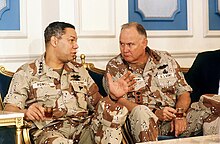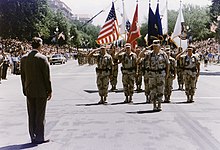Norman Schwarzkopf junior
H. Norman Schwarzkopf junior ("Stormin 'Norman"), KCB (born August 22, 1934 in Trenton , New Jersey , † December 27, 2012 in Tampa , Florida ) was a general in the US Army . From 1988 to 1991 he was the commander of the United States Central Command and commander of the coalition forces in the Second Gulf War .
Military career
Years of training
Schwarzkopf's father Herbert Norman Schwarzkopf only passed the first letter of his first name on to his son because he never wanted to be called Herbert himself. In 1942 Schwarzkopf's father was drafted into the US Army and a little later he was sent to a military school himself . On his 12th birthday, Schwarzkopf moved to live with his father, who was stationed in Iran . From then on he lived only among soldiers . He liked it very much in Iran, his father often took him to official receptions, so that he soon got to know the work of a general better. During this time he developed an understanding of Middle Eastern culture , which has proven helpful throughout his career.
In 1947 he graduated from an international school in Geneva and then lived in Frankfurt am Main and Heidelberg . In 1950 he finally returned to the United States , where he graduated from the Valley Forge Military Academy . He then graduated from the US Military Academy at West Point , which his father had graduated from in 1917, and graduated in 1956 as the 42nd of his year with a Bachelor of Science degree in mechanical engineering. In 1964 he graduated from the University of Southern California the Master in Mechanical Engineering. After graduating from West Point, Schwarzkopf was transferred to the infantry as a second lieutenant . His first assignment was as platoon leader (platoon leader) and executive officer of the 2nd Airborne Combat Group in Fort Benning , Georgia .
In Fort Benning he then received advanced training as an infantry and airborne officer. He was then used as a first lieutenant in the 101st US Airborne Division in Kentucky and the 6th US Infantry Division in Germany. From 1960 to 1961 he was adjutant in US-Berlin-command and he was in 1961, Captain ( Captain transported). In 1965 he went back to the United States and taught engineering at the United States Military Academy .
Vietnam War
When Schwarzkopf taught in his first year at the faculty at West Point in 1965, he decided to go to South Vietnam and serve there as a military advisor to the Military Assistance Advisory Group in the flare-up Vietnam War .
In Vietnam, Schwarzkopf served as a consultant for a South Vietnamese airborne division and was promoted to major in this role. After a year of service in Vietnam (tour of duty) , two major battles, five medals, two tropical diseases and one wound, he returned to the United States and completed the remaining two years of teaching at West Point. In 1968 he was promoted to Lieutenant Colonel and married. In early 1970 he went to Vietnam again for a year. During this time, Schwarzkopf had to completely reorganize entire troop units.
Promotion to general

During the 1970s, he graduated from the US Army War College , served on the Army General Staff and later served as the Deputy Commander of US Forces in Alaska under Brigadier General Willard Latham.
After being promoted to brigadier general , Schwarzkopf served two years as an assistant officer for planning and strategy ( J3 ) with the US Pacific Command . He then served as Assistant Division Commander (replenishment) of the 8th Infantry Division (Mechanized) and at the same time as US Location elder of Mainz used and was therefore for the US security forces during the first visit to Germany by Pope John Paul II. In charge in November 1980 , because the Pope was moving on military grounds on the Layenhof near Mainz-Finthen . In 1982 he was promoted to major general and took command of the 24th Infantry Division (mechanized) at Fort Stewart , Georgia . After a year in that service, he was given command of the ground forces of Operation Urgent Fury and, having won the trust of his superior, was appointed deputy commander of the Joint Task Force . In 1984 Schwarzkopf returned to the Ministry of Defense, where he served on the Army General Staff as an assistant to Lieutenant General Carl Vuono , who was then Deputy Chief of Staff for Operations. In 1986, Schwarzkopf was finally promoted to Lieutenant General and was appointed Commanding General of the 1st US Corps at Fort Lewis . After a year in this command, he was called back to Washington, DC, to the Pentagon to serve as General Vuono's assistant, who was now in command of the United States Army Training and Doctrine Command .
Second Gulf War


In 1988 Schwarzkopf was promoted to general and took command of the US Central Command (CENTCOM). In this use he drafted, among others, a detailed plan for the defense of the oil fields in the Persian Gulf in the event of an invasion by Iraq . The Iraq plan served as the basis for a CENTCOM exercise in 1990. A few months later, Iraq invaded Kuwait and the plans became the basis for Operations Desert Shield and Desert Storm .
His plan of operation was the so-called "left hook" (left hook) , who brought the US troops in Iraq by the Iraqi forces dealt, who were in Kuwait. So the ground war was over after only four days. Schwarzkopf was very present in the media during the operation, gave press conferences and was nicknamed Stormin 'Norman (German for "storming Norman"). After the Second Gulf War, he was made an honorary soldier of the French Foreign Legion (Caporal honoraire de la Légion étrangère) , making him the only American to be honored in this way.
Next life
Schwarzkopf joined in 1991 to retire and published in 1992 his autobiography It Does not Take a Hero (dt .: You have to be a hero ). He had sold his memoirs to the American publishing house Bantam Doubleday Dell for more than 5 million US dollars.
In 1993 he was diagnosed with prostate cancer but successfully treated. He was an honorary director of the Multiple Myeloma Research Foundation . After his retirement there were rumors about his involvement in politics, but these did not come true. In retirement he worked as a military analyst, most recently for Operation Iraqi Freedom . Schwarzkopf last lived in Tampa (Florida). He was a member of the Association of People with High IQs Mensa . He died on December 27, 2012 of complications from pneumonia .
Awards and honors
Selection of decorations, sorted based on the Order of Precedence of the Military Awards:
-
 Defense Distinguished Service Medal
Defense Distinguished Service Medal
-
 Army Distinguished Service Medal (4 ×)
Army Distinguished Service Medal (4 ×) -
 Navy Distinguished Service Medal
Navy Distinguished Service Medal
-
 Air Force Distinguished Service Medal
Air Force Distinguished Service Medal
-
 Coast Guard Distinguished Service Medal
Coast Guard Distinguished Service Medal
-
 Silver Star (3 ×)
Silver Star (3 ×) -
 Defense Superior Service Medal
Defense Superior Service Medal
-
 Legion of Merit
Legion of Merit
-
 Distinguished Flying Cross
Distinguished Flying Cross
-
 Bronze Star (3 ×)
Bronze Star (3 ×) -
 Purple Heart (2 ×)
Purple Heart (2 ×) -
 Meritorious Service Medal (7 ×)
Meritorious Service Medal (7 ×) -
 Air Medal (9 ×)
Air Medal (9 ×) -
 Army Commendation Medal (4 ×)
Army Commendation Medal (4 ×) -
 National Defense Service Medal (2 ×)
National Defense Service Medal (2 ×) -
 Vietnam Service Medal (5 ×)
Vietnam Service Medal (5 ×) -
 Presidential Medal of Freedom
Presidential Medal of Freedom
-
 Grand Officer of the French Legion of Honor
Grand Officer of the French Legion of Honor
-
 Knight Commander of the Order of the Bath , as a US citizen without elevation to the British knighthood
Knight Commander of the Order of the Bath , as a US citizen without elevation to the British knighthood
- Congressional Gold Medal
1990 awarded him the United States Sports Academy in Daphne the honorary doctorate .
literature
- Anderson, Jack; Van Atta, Dale: Stormin 'Norman: An American Hero: Life of Norman Schwarzkopf. Zebra Books, 1991, ISBN 0-8217-3562-4 .
- Schwarzkopf, H. Norman & Petre, Peter: It doesn't take a hero , Bantam 1993, ISBN 0-553-56338-6 . dt. You don't have to be a hero. The autobiography , Goldmann-TB, Munich 1994, ISBN 9783442125609 .
Web links
- Literature by and about Norman Schwarzkopf junior in the catalog of the German National Library
- Norman Schwarzkopf in the nndb (English)
Individual evidence
- ↑ https://www.youtube.com/watch?v=GEPVvIL-qPQ
- ^ The Wall Street Journal: [1] . Retrieved December 28, 2012.
- ^ Honorary Doctorates. In: ussa.edu. United States Sports Academy, archived from the original on May 4, 2014 ; accessed on May 4, 2014 .
| personal data | |
|---|---|
| SURNAME | Schwarzkopf, Norman junior |
| ALTERNATIVE NAMES | Stormin 'Norman (nickname); Schwarzkopf, Herbert Norman (full name) |
| BRIEF DESCRIPTION | American general in command of coalition forces during the Second Gulf War |
| DATE OF BIRTH | August 22, 1934 |
| PLACE OF BIRTH | Trenton , New Jersey |
| DATE OF DEATH | December 27, 2012 |
| Place of death | Tampa |

